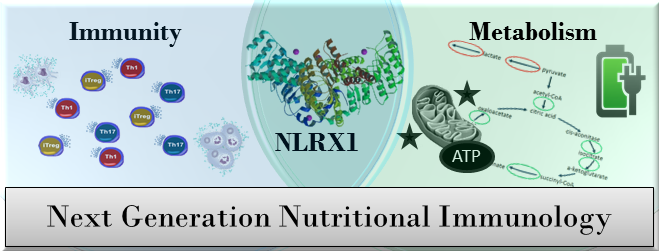Next Generation Nutritional Immunology

BLACKSBURG, VA. February 6, 2017 – The Nutritional Immunology and Molecular Medicine Laboratory (NIMML) at the Biocomplexity Institute recently characterized new a mechanism of action underlying the regulation of immunity and metabolism by nucleotide oligomerization domain like receptor X1 (NLRX1), an immunoregulatory molecule that had previously been connected to viral immune responses and broader anti-inflammatory effects. The new NLRX1 mechanism synchronizes cellular metabolism and T cell function. The findings were published in a recent paper in the Journal of Immunology.
The loss of NLRX1 results in an increase in inflammatory T cells in mouse models of inflammatory bowel disease (IBD) coinciding with a shift in metabolic function. Specifically, NLRX1 deficiency diverts resources from the citric acid cycle and allocates them toward the production of lactate. Interestingly, when this shift is prevented, NLRX1-deficient T cells behave no differently than a wild type cell.
Due to an incomplete understanding of the conditions surrounding NLRX1, the pursuit of targeting this molecule as a potential therapy had previously stalled. The results in the Journal of Immunology paper by the NIMML team shed new mechanistic insights on the role of NLRX1 in mucosal immunity and metabolism.
The discovery of NLRX1 on the immunometabolic interface lends support that nutrition and cellular metabolism are intimately linked with immune function. As such, immunoregulatory molecules like NLRX1, PPARs, or lanthionine synthetase C-like 2 (LANCL2) serve as potent therapeutic targets applicable to a spectrum of inflammatory and immune-mediated diseases.
The need to produce energy is inherent to all cells within the body. However, as research delves into the field of immunometabolism, it has become clear that inflammatory, regulatory and memory cells have distinct patterns of metabolic preferences across not only T cells, but also macrophages and dendritic cells as well epithelial cells and their functional subsets. Whether fulfilling a need to proliferate, produce cytokines, or sustain a long lifespan, the targeting of cellular metabolism offers new therapeutic possibilities beyond traditional immunological targets in disease.
“For decades, immunologists have applied reductionist approaches to studying the smallest details of the immune response without considering crucial system-wide interactions with nutrition and metabolism,” said Josep Bassaganya-Riera, a Professor of Immunology and Director of the NIMML at Virginia Tech, and the corresponding author of the paper. “Our laboratory has built computational and mathematical models capable of analyzing complex massively interacting systems, including interactions between immunity and metabolism. This study not only elucidates novel mechanisms of immunoregulation in IBD, but it also validates transcriptomic and computational modeling studies that predicted the importance of NLRX1 in regulating gastrointestinal inflammation and its potential as a therapeutic target for infectious and immune-mediated diseases.”
The NIMML has been at the forefront of developing nutritional-based therapies for immune-mediated disease, most prominently IBD. Additional exploration into immunometabolism may hold the reasons as to why molecules targeted by dietary molecules can provide critical immunological feedback that ameliorates disease and pathology.
“This seminal work, while impactful independently, sets the stage for the next lines of investigation at NIMML,” said Andrew Leber, NIMML Ph.D student in Genetics, Bioinformatics, and Computational Biology. “It highlights the need to understand not only the immediately relevant pathways for novel immunoregulatory genes but its global effect on all of the cohesive processes within a cell, a goal that we will continue to pursue.”
For More Information:
About NIMML
The NIMML Institute is a 501 (c) (3) non-profit public charity foundation focused on a transdisciplinary, team-science approach to precision medicine at the interface of immunology, inflammation, and metabolism. The NIMML Institute team has led numerous large-scale transdisciplinary projects and is dedicated to solving important societal problems by combining the expertise of immunologists, computational biologists, toxicologists, modelers, translational researchers, and molecular biologists. The Institute is headquartered in Blacksburg, VA. For more information, please visit www.nimml.org or contact pio@nimml.org.
